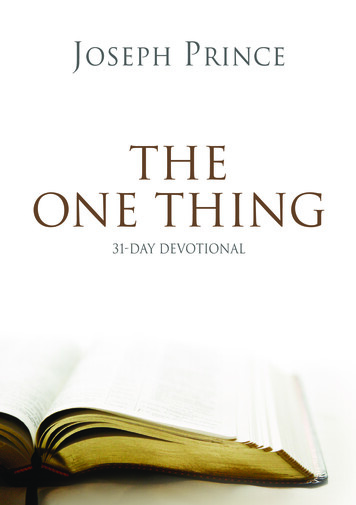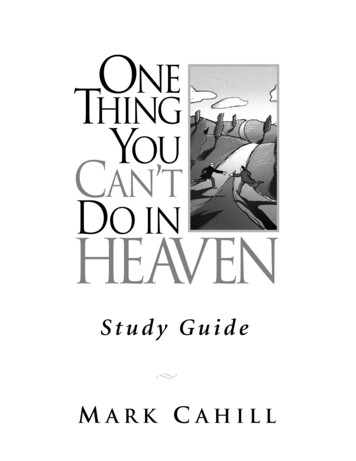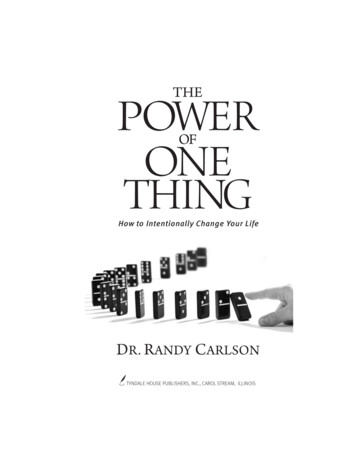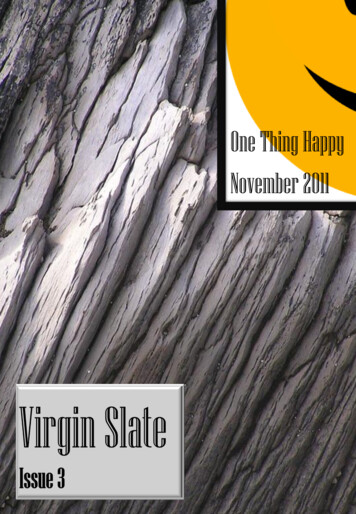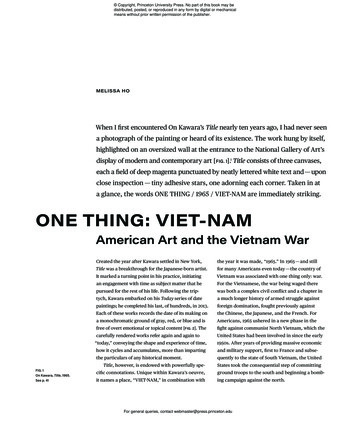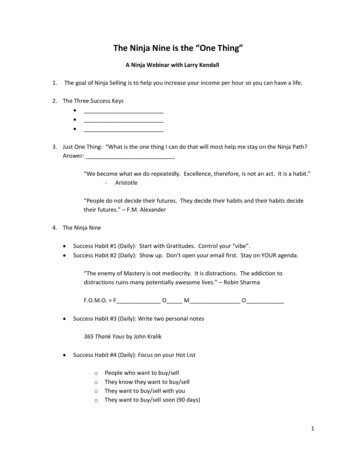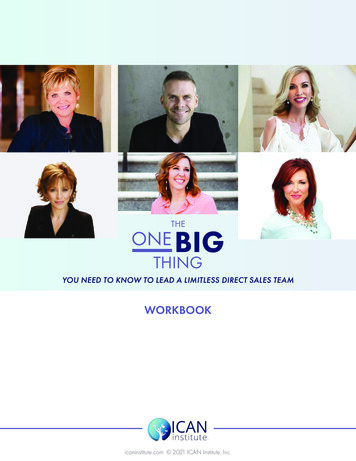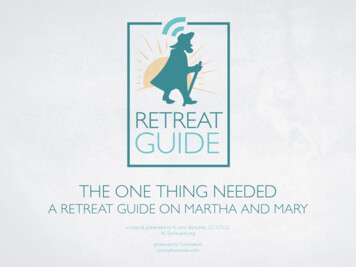
Transcription
THE ONE THING NEEDEDA RETREAT GUIDE ON MARTHA AND MARYwritten & presented by Fr. John Bartunek, LC, S.Th.D.RCSpirituality.orgproduced by Coronationcoronationmedia.com
TABLE OF CONTENTSPlease select a section below or continue on to the next page1INTRODUCTION3FIRST MEDITATIONFriendship with Jesus Is the One Thing NeededIntroductionChrist’s Point of ViewJesus FirstArgument from ExperienceSupernatural BenefitsConclusion: The Daily Choice1610SECOND MEDITATIONOnly Grace Gives Lasting Value to Our ActionsCONFERENCEKeeping Christ FirstIntroductionIntroductionWorshipThe Vine and the BranchesJoyImages of FrustrationMercySt. Phillip Neri’s Conversation-StopperRestConclusion: A Bit Too Scrawny?Conclusion: Cooking the One Thing NeededTABLE OF CONTENTS
INTRODUCTIONRetreat OverviewWay back in the Golden Age of Hollywood, around the time of World WarII, a classic movie was almost aborted. In fact, its producers were offered fullcompensation for the entire cost of the film, if they would agree to destroy itinstead of releasing it to the public. That’s how controversial this movie was.But they didn’t destroy it. They released it, in September 1941, and it endedup being nominated for nine Academy Awards. It also ended up becomingone of the few films that all the critics and filmmakers ever since consistentlyspeak of as perhaps the greatest movie of all time. In polls and surveys, italways seems to find its place near the top of the list. The movie is calledCitizen Kane.It’s about Charles Foster Kane, a man who has everything: worldwide fame,unlimited wealth, terrifying power. And yet, in spite of having all thosethings, he dies sad and unfulfilled.As the movie begins, the cameras slowly make their way towards Kane’sdeathbed, first giving the viewers an eerie tour of his immense estate, whichincludes breathtakingly beautiful grounds, a private zoo, and manicuredgardens. Then we are brought into his vast mansion, and the cameras showus endless rooms crammed with innumerable artistic and cultural treasuresand gorgeous, elaborate furnishings. Finally we are brought into the presenceof the dying man, who holds in his hand a little toy that reminds him of hisboyhood. Wistfully thinking of his lost youth, unsatisfied, frustrated, andsorrowful, he passes away, with a mysterious word on his lips.The rest of the film is an attempt to find out the meaning of that mysteriousword, and consists of a series of flashbacks that show how he had acquired somuch, and yet lived so unhappy a life.And that is a question we all need to think about from time to time. We canpursue so many things in life — approval, awards, comfort, fame, influence,money, pleasure, popularity, possessions, success. But which of these willtruly bring us the fulfillment we yearn for?Among the vast array of all that the world offers us, what is the one thingthat really matters?INTRODUCTIONIn this Retreat Guide, The One Thing Needed: A Retreat Guide on Martha andMary, that’s what we will reflect on.In the first meditation, we will look at what Jesus calls “the one thingneeded.”In the second meditation, we will look at the relationship between thatone thing and all the other things that make up our daily life.And in the conference, we will review God’s own not-so-secret formulafor helping us keep our priorities straight: the Third Commandment.None of us wants to reach the end of life filled only with sorrow, regret, andfrustration, like Citizen Kane; we want to find and experience the meaningthat God created us to enjoy. As we start this retreat, let’s take a fewmoments to tell that to Jesus once again, in the silence of our hearts:let’s renew our faith in the power of his truth to guide us through theups and downs of life;let’s renew our hope in the power of his goodness to fulfill our deepestdesires;and let’s renew our humble love for him who created us, redeemed us,and calls us, every single day, to live a more and more abundant life bychoosing the one thing needed.1
INTRODUCTIONLuke 10:38-42To begin, let’s prayerfully read through the Gospel passage that we will bemeditating on, Luke 10:38-42.As they continued their journey he [Jesus] entered a village where a womanwhose name was Martha welcomed him. She had a sister named Mary [who]sat beside the Lord at his feet listening to him speak. Martha, burdened withmuch serving, came to him and said, “Lord, do you not care that my sister hasleft me by myself to do the serving? Tell her to help me.” The Lord said to herin reply, “Martha, Martha, you are anxious and worried about many things.There is need of only one thing. Mary has chosen the better part and it will notbe taken from her.”INTRODUCTION2
FIRST MEDITATIONFriendship with Jesus Is the One Thing NeededFriendship with Jesus Is the One Thing Needed. If Jesus Christ truly is theone Lord of life and history, the one Savior, the one Way, Truth, and Life(which he is), then it is certain that “only one” thing is needed for a fulfilling,meaningful, and fruitful life: to stay as close to him as possible at all times.Much more important than what we can do for Christ is what we can be forhim, and what he can be for us. Martha was doing all kinds of tasks, and thatwas good. But Mary was listening to him, letting him serve her, being hisclose, intimate friend, and that was even better, “the better part”.Friendship with Christ is the one thing needed. Therefore, our task here onearth is to make a conscious choice to shape our lives accordingly, to keepChrist first, to live from his love and for his love. Jesus doesn’t congratulateMary because she won the spiritual lottery or had received a particularlybeautiful soul from God.He praises her because she has “chosen the better part.” She chooses it. Shechooses to submit to the Lord, to let him be for her what he in truth alreadyis for everyone — the one thing needed.Martha, on the other hand, has a divided heart. She loves Christ, but she stilldepends on her own strength to earn his love in return. She hasn’t learnedthat what matters is not so much what we can do for Christ as what he hasdone and wants to do for us.Jesus kindly teaches her in this encounter that the greatest thing she can dofor him, the “one thing needed”, is to let him rule completely over her heart,to take her place at his feet and listen to his words.FIRST MEDITATION3
FIRST MEDITATIONChrist’s Point of ViewLet’s try to see this scene from Christ’s perspective.From this passage and other New Testament passages, we know that Jesusloved both Martha and Mary. They were close friends who knew him wellenough to invite him to dinner. Some biblical commentators claim that theywere relatives of his. Martha was so comfortable with him that she didn’tthink twice about involving him in her family squabble. The atmosphereis casual, friendly, almost like a barbecue. Martha is doing all the work,and Mary is just sitting at Christ’s feet listening to him converse with theApostles.It’s understandable that Martha would get perturbed. Feeding 15 people isno small task, and she could have used her sister’s help. So she tries to getJesus to tell Mary to lend a hand — a reasonable request. But Jesus doesn’t.He actually commends Mary and reproves Martha. Why?Christ was glad to be served, but what he really desires is simply to beloved. He yearns for our hearts. He is much less interested in our résuméof achievements (Martha probably had a great résumé) than in the love withwhich we achieved them — because he knows that we weren’t created toachieve, but to love.He was happy that Mary wanted to listen to him, wanted to sit beside himand spend time with him. Martha, on the other hand, had lost focus; she hadallowed her heart to be divided by vanity, by a tinge of self-centeredness.How do we know this? Because she was upset.If she had been working out of simple love, she would have been glad to lether sister enjoy Christ’s conversation, even if it meant that dinner wouldn’t bequite as perfect as she wanted. She may have even delayed preparing dinnerso she could join the group in the living room. But Martha has become sopreoccupied with getting everything done just right, just the way she wants it,that she has temporarily forgotten why it’s worth doing in the first place.So when she complains, Jesus seizes the opportunity to remind her ofwhat’s really important: not activities and achievements, even really goodones, but the relationship that should be at the heart of those activities andachievements.FIRST MEDITATION4
FIRST MEDITATIONJesus FirstWe know that Jesus Christ truly is the one Lord of life and history; the oneSavior, the one Way, Truth, and Life, as he himself explained during the LastSupper (John 14:6).We know, as St. Peter explained on Pentecost, thatThere is no salvation through anyone else, nor is there any other name underheaven given to the human race by which we are to be saved.– Acts 4:12And since that is true, we also know that the “one thing needed” for us tolive the most meaningful, fulfilling, and fruitful lives possible is simply to stay asclose to him as we can at all times.This is the lesson Jesus wants to teach Martha when she comes to him tocomplain about her sister Mary. Martha was “burdened with serving,” shewas “anxious and worried about many things” — all the tasks that go withpreparing a good meal for honored and unexpected guests.We can all certainly relate to that. We have all been “anxious and worried”about many things from time to time. And Jesus doesn’t say that that’s abad thing. He appreciates our efforts to do good in his name, to do worthythings for him and for those he loves.And yet, much more important than what we can do for Christ is what wecan be for him, and what he can be for us. Mary, Martha’s sister, was sittingat the Lord’s feet, “listening to him speak.” She was letting him serve her.She was being his close, intimate friend. She was letting him set the agendafor her activity, and that was even better than what Martha was doing.Jesus calls it, in fact, “the better part.” This friendship with Jesus Christ, thisputting his presence and his Word first, this “better part” — that is “the onething needed.”FIRST MEDITATION5
FIRST MEDITATIONArgument from ExperienceOne of the most famous martyrs in the history of the Church gave amemorable testimony to this truth.His name was St. Polycarp, and he was the bishop of Smyrna (in modernday Turkey) in the early second century. During one of the many wavesof persecution that rocked the first centuries of Christianity, Polycarp wasarrested and brought to trial before the local governor.He was already an old man, but still an active and revered bishop. It wasaround the year 166 AD. The governor ordered him to renounce his faith inChrist, to blaspheme Jesus. (The Roman authorities at the time persecutedthe Christians not because they committed crimes, but because they refusedto worship the Roman gods.)Polycarp answered:I have served Christ these fourscore and six years, and he never did me anyharm, but much good; and how can I blaspheme my King and my Savior?.Hear my free confession: I am a Christian.As a result of this profession of faith, Polycarp was sentenced to publicexecution by being burned alive at the stake. The flames failed to damagehim. Eye witnesses say that the flames rose to a great height, surroundinghim like a transparent circular wall in the middle of the stadium. He seemedto glow with a golden light, but remained unharmed. Finally, the guards hadto kill him with the thrust of a spear.Polycarp’s answer to the governor shows that he knew all about “theone thing needed.” For him, Christ was a faithful friend who had neverabandoned him in his 86 years of life. That friendship was what gave his lifemeaning — not fame, not power, not pleasure, not even his achievements andministry.It was friendship with Jesus that was the one thing needed, and so he refusedto betray that friendship, even if it meant public humiliation, torture, beingseparated from his people, and giving up everything else.FIRST MEDITATION6
FIRST MEDITATIONSupernatural BenefitsKeeping our relationship with God as our highest priority enables us tolive supernaturally. It gives God room to do things in our lives that, by ournatural powers alone, we could never do — like keeping our hearts calmeven when life burdens us with many cares and anxieties.But Mary would have encouraged her to put those small, natural resourcesinto the Lord’s hands, so that he could work wonders. Even if our activitiesand achievements seem as small as a mustard seed, God can make them growinto the “largest of plants. and the birds of the sky come to dwell in itsbranches” (Matthew 13:32).Imagine if Martha and Mary had been present when Jesus multiplied theloaves and fish. Martha would have despaired of being able to feed thousandsof people with just a few loaves of bread and fish.FIRST MEDITATION7
FIRST MEDITATIONConclusion: The Daily ChoiceEvery day we are faced with the choice to be more like Martha or morelike Mary. This is one of the most amazing things about Christianity. Godrespects our freedom so much that, in a sense, he leaves our destiny in ourown hands.We can freely choose our priorities in life. We can make our ownachievements our highest priority, like Martha was doing, or we can makeknowing, loving, and imitating Christ our highest priority.Christ offers the benefits of following him to all people, but he leaves eachperson supremely free to accept or reject them. And the offer is not a onetime affair.Martha chose to busy herself with her own plans on this occasion, but youcan bet she adjusted her behavior the next time. Mary chose to listen to theLord this time, but he wouldn’t force her to do so again the next time. Everysingle time we choose to give Christ and his will top priority, we allow hissanctifying, healing grace to seep deeper into our lives.Right now, we have chosen to be here listening to the Lord. What will wechoose tomorrow, and the next day, and the day after? Jesus is hoping thatwe will continue to choose this better part, this one thing needed, each andevery day. As Pope Benedict XVI put it in a speech he gave during his visit tothe United States of America in 2008:People today need to be reminded of the ultimate purpose of their lives. Theyneed to recognize that implanted within them is a deep thirst for God. Theyneed to be given opportunities to drink from the wells of his infinite love. Itis easy to be entranced by the almost unlimited possibilities that science andtechnology place before us; it is easy to make the mistake of thinking wecan obtain by our own efforts the fulfillment of our deepest needs. This is anillusion. Without God, who alone bestows upon us what we by ourselves cannotattain, our lives are ultimately empty. People need to be constantly remindedto cultivate a relationship with him who came that we might have life inabundance (cf. Jn 10:10).– Benedict XVIMeeting with bishops, Washington, DC, 16 April 2008Take a few minutes now to thank God, in the silence of your heart, forteaching us this all-important truth — that our relationship with him really isthe one thing needed.Speak to him about that — speak from the sincerity of your heart, just asMartha did. And then listen with your heart - just as Mary did - to whateverhe has to say in response. The following questions and biblical passages mayhelp your meditation.FIRST MEDITATION8
Questions for Personal Reflection or Group Discussion1What types of situations tend to make me “anxious and worried aboutmany things,” like Martha? How do I usually respond to them?2Mary “sat beside the Lord at his feet listening to him speak.” Whatwould it look like for me to do that in my life, without shirking my Godgiven duties and responsibilities?3What things in my life tend to try and usurp Jesus’ place as the “one thingneeded” to make my life happier? Talk to Jesus about those things, andask him to help you see them as he sees them.Biblical Passages to Help Your Meditation[But] whatever gains I had, these I have come to consider a loss because ofChrist. More than that, I even consider everything as a loss because of thesupreme good of knowing Christ Jesus my Lord. For his sake I have acceptedthe loss of all things and I consider them so much rubbish, that I may gainChrist and be found in him, not having any righteousness of my own based onthe law but that which comes through faith in Christ.– Philippians 3:7-9, NABROne thing I ask of the LORD; this I seek: To dwell in the LORD’s house all thedays of my life, to gaze on the LORD’s beauty, to visit his temple. For God willhide me in his shelter in time of trouble; He will conceal me in the cover of histent; and set me high upon a rock. Even now my head is held high above myenemies on every side! I will offer in his tent sacrifices with shouts of joy; I willsing and chant praise to the LORD.–Psalm 27:4-6, NABRTo the angel of the church in Ephesus, write this: The one who holds the sevenstars in his right hand and walks in the midst of the seven gold lampstands saysthis: “I know your works, your labor, and your endurance, and that you cannottolerate the wicked; you have tested those who call themselves apostles but arenot, and discovered that they are impostors. Moreover, you have enduranceand have suffered for my name, and you have not grown weary. Yet I hold thisagainst you: you have lost the love you had at first. Realize how far you havefallen. Repent, and do the works you did at first.– Revelation 2:1-5, NABRFIRST MEDITATION9
SECOND MEDITATIONOnly Grace Gives Lasting Value to Our ActionsIt’s possible to get a bit frustrated with this passage about Martha and Mary.We tend to identify with Martha more than with Mary. Most of us, I imagine,would very much like to have enough leisure time to be able to just sit atthe Lord’s feet and listen to him speak, like Mary. But who has the luxury ofbeing able to sit and pray all day long?We, like Martha, have households to run, jobs to do, responsibilities to fulfill,work that simply can’t wait. And after all, both Martha and Mary are saints,so do I really need to worry about choosing the better part anyway?Blessed Cardinal Newman, the famous 19th century British Scholar whocaused widespread public scandal in England by converting to Catholicism,once gave a sermon on this passage from Luke’s Gospel.He observed that there are certain periods or conditions in life that lendthemselves to a more Mary-like existence. Children, before they areburdened with weighty responsibilities, can simply enjoy the presence of theLord, he argued in the sermon. The elderly, having spent their lives in activeservice of the Lord, can enjoy the quiet of contemplation. Likewise thosewho are unmarried or infirm.This point of view would seem to ease our frustration a bit, letting us offthe hook, so to speak, unless we find ourselves in one of those conditions.But I wonder if we may be letting ourselves off the hook a little too soon.We can’t deny that, as Cardinal Newman points out, certain seasons orconditions of life lend themselves to a less externally active way of servingGod. But even the more contemplative states of life, as long as we are stillresidents of this fallen world, involve effort and work: chores, and ministry,and serving one’s neighbor, and suffering, and fighting temptation, and thebattle of prayer — no one is exempt from these taxing activities.Pope Benedict XVI pointed this out, indirectly, when he renounced thepapacy in the winter of 2013. In his final Angelus address (25 February 2013),he explained thatThe Lord is calling me to “scale the mountain,” to dedicate myself still more toprayer and to meditation.But then he went on to say that this new season wouldn’t be less spirituallyactive. He explained:But this does not mean abandoning the Church — on the contrary, if Godasks this of me, it is to serve the Church with the same dedication and thesame love with which I have tried to do so hitherto, but in a way that is moreadapted to my age and my strength.In other words, whether our state in life is externally more like Martha’s ormore like Mary’s, what really matters, for our good and for God’s glory, iswhat goes on internally — the level of our “dedication and love.”What Jesus calls the “one thing needed” is always just that: the one thingneeded, no matter the circumstances of life.SECOND MEDITATION10
SECOND MEDITATIONThe Vine and the BranchesJesus made this same point during the Last Supper, when he told his Apostlesthe parable of the vine and the branches. He knew that he was sending themon a challenging mission, a life full of much service and many cares — a lifelike Martha’s.And yet, with this parable of the vine and the branches, he reminds them theywill have to keep choosing Mary’s part, the better part, even in the midst oftheir missionary activity. He said:Unless we stay plugged into Christ and his grace, unless we daily feed oursouls with his words, unless everything we do flows out of our friendshipwith him - the one thing needed — none of our actions, even the good ones,can have lasting value.And only lives of lasting value will give true peace to our hearts. If we beginand end everything we do at the feet of Jesus, in a loving conversation withhim, we will never end up being irresponsible or lazy or spaced out — we willbe more focused, and effective, and fruitful than ever: the one thing neededwill always make everything else fall into its proper place.Remain in me, as I remain in you. Just as a branch cannot bear fruit on its ownunless it remains on the vine, so neither can you unless you remain in me. I amthe vine, you are the branches. Whoever remains in me and I in him will bearmuch fruit, because without me you can do nothing.– John 15:4-5In his encounter with Mary and Martha, Jesus is teaching us all the samelesson. As Christians, everything we do should flow out of our relationshipwith God. That is how our lives will bear the fruit of meaning, happiness, andgoodness that we desire and that this world needs so desperately.That is also how we will avoid falling into the trap Martha fell into — ofallowing our many activities and responsibilities to choke our spirits, sothat we become anxious and worried, frustrated and stressed, angry andjudgmental.Jesus isn’t saying that we shouldn’t do things, serve others, work hard, putour talents and skills to good use, and honor our commitments.No, Jesus doesn’t reprimand Martha for her activity. He reprimands her forbeing “worried and anxious” about all those activities. She has become socaught up in getting things done, that she has lost sight of why she is doingthem.She is like a branch desperately trying to bear fruit by its own power. Theresult is predictable frustration, anger, impatience, losing her temper.SECOND MEDITATION11
SECOND MEDITATIONImages of FrustrationMost of us have probably had the experience of typing away on the computer,and then when you press enter, something goes wrong. The screen goesblank, and you lose all your work. Living life without keeping Christ firstis just like that — at the end, when we click enter, when we face the lastjudgment, nothing that we did will matter, because it wasn’t done out of love.We weren’t online with Christ’s friendship while we were doing it.You may have had the experience of talking away on a cell phone, makingyour point, and then you finish, and there is no response on the other end.Somehow, in the middle of your conversation, the connection dropped, andnothing you said registered. When we try to make progress in life withoutdepending on Christ, it’s like talking into a cell phone that just dropped itsconnection: a lot of noise, but no lasting communication.SECOND MEDITATIONWe have all probably had the experience of riding a bike when the chaincomes loose. You pedal harder and faster, but you can’t make any progress.All of your effort is being expended without moving the bike forward,because the chain is broken. Our friendship with Christ is the chain. Withoutit, we can pedal hard and work up a sweat in life, but we don’t achieve ourreal purpose: a deeper and deeper communion with God.In the past, prisoners of war were sometimes forced to dig huge holes. Theywould work fourteen hour days under close supervision. Then, when theholes were finally dug, they would be ordered to start filling them in again.This is what life is like when we don’t keep Christ first, when we don’t choosethe better part, when we lack the one thing needed.No matter how much activity we engage in, none of it really matters. Abranch cut off from the vine simply can’t bear fruit.12
SECOND MEDITATIONSt. Phillip Neri’s Conversation StopperSt. Phillip Neri learned this lesson well. His holiness and good humor madehim the most sought-after priest in the city of Rome during the mid-1500s.He was an adviser to popes and cardinals, kings and dukes, and also tobeggars and bakers. Universally loved and respected, he reformed a corruptcity almost single-handedly.The story goes that one day a young man came to him after finishing his barexam. After years of study, the young man had finally made the grade, andwas about to begin a promising career in the law. He was also courting anattractive, popular young lady. He was positively beaming with enthusiasmas he described his optimistic plans: first he would take a respectable job as alegal clerk, then he would marry his girl.St. Phillip asked him one question. He said, “And then?”· So the young mancontinued, explaining how he would climb the ladder of success and raisea family. St. Phillip asked him another question. He said: “And then?” Atthat, the young man frowned and thought for a moment. Then he startedstammering about becoming a famous judge and having grandchildren, but hisenthusiasm seemed to be waning.St. Phillip smiled, peered into his eyes, and asked him another question.He said: “And then?” The young man looked at the saint with panic andconfusion - he had never really thought that far ahead. He slowly walkedaway to think things over — to sit for awhile at Christ’s feet and ask him whatthe Lord wanted him to do. The next day he joined St. Philip’s oratory, andeventually he became a holy, fruitful priest.Not all of us are called to the priesthood or consecrated life, but all of us arecalled to keep Christ first, to live our lives under his wise and loving lordship,not just according to whim or fashion. After all, God has revealed to us thatat some point, the “one thing needed” will be the only thing left.SECOND MEDITATION13
SECOND MEDITATIONQuestions for Personal Reflection or Group DiscussionConclusion: A Bit Too Scrawny?Most of us are probably already united to the vine — or at least we wantto be. That’s why we’re here right now. But it is possible to be a scrawnybranch, a branch with only a little sap flowing through it. If we want our livesto bear more fruit, we need a lot of sap; we need to be healthy branches fullyunited to the vine. This is “the one thing needed.”In the conference, we will take a closer look at one very practical way todeepen our connection to the vine. But for now, take a few minutes toreflect once again on this encounter between Jesus, Martha, and Mary. Putyourself into the scene. Watch how Jesus treats his two close friends; hearhis tone of voice as he converses with them. And then watch as he turns hisloving gaze towards you and says. something that he really wants to tell you.The following questions and Bible verses may help your meditation.1The YOUCAT (Youth Catechism #89) says: “The ‘kingdom of God’begins in those who allow themselves to be transformed by God’s love.”What do I think that means (put it in my own words), and how does itapply to my life?2Imagine that a couple of news reporters were to follow me around for aweek, just observing my choices and behavior without actually speakingto me. What would they conclude is the “one thing needed” in my life?3In his general audience on January 16th, 2013, Pope Benedict XVI madethe following statement. Read it over prayerfully, and try to apply it toyour own life:The important thing is that we follow Christ not only when we are inneed and when we find space for it in our daily affairs, but with ourlives as such. The whole of life should be directed towards encounteringHim, towards loving Him; and, in it, a central place must also be givento the love of one’s neighbor, that love that, in the light of the CrucifiedOne, enables us to recognize the face of Jesus in the poor, the weak,the suffering. This is only possible if the true face of Jesus has becomefamiliar to us in listening to His Word, in interior dialogue, in entering intothis Word in such a way as to really encounter him, and, naturally, in theMystery of the Eucharist.SECOND MEDITATION14
Biblical Passages to Help Your MeditationRejoice always. Pray without ceasing. In all circumstances give thanks, for this isthe will of God for you in Christ Jesus.– 1 Thessalonians 5:16-18, NABRIf then you were raised with Christ, seek what is above, where Christ is seatedat the right hand of God. Think of what is above, not of what is on earth. Foryou have died, and your life is hidden with Christ in God. When Christ your lifeappears, then you too will appear with him in glory.– Colossians 3:1-4, NABRTherefore, that I might not become too elated, a thorn in the flesh was givento me, an angel of Satan, to beat me, to keep me from being too elated. Threetimes I begged the Lord about this, that it might leave me, but he said to me,“My grace is sufficient for you, for power is made perfect in weakness.” I willrather boast most gladly of my weaknesses, in order that the power of Christmay dwell with me. Therefore, I am content with weaknesses, insults, hardships,persecutions, and constraints, for the sake of Christ; for when I am weak, then Iam strong.– 2 Corinthians
Friendship with Jesus Is the One Thing Needed. If Jesus Christ truly is the one Lord of life and history, the one Savior, the one Way, Truth, and Life (which he is), then it is certain that “only one” thi
